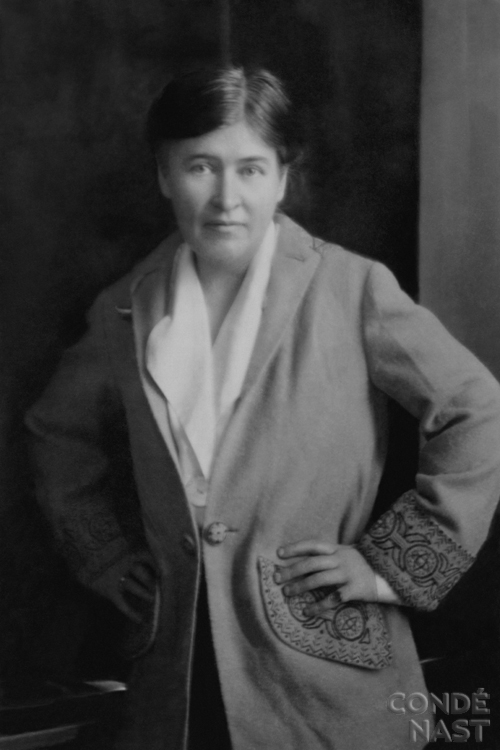Dress Up with Willa Cather’s O Pioneers!
Like Disney movies, creamy coffee desserts, and many other things, Willa Cather is a terrifyingly terrific treasure. Being a boy, it’s somewhat bothersome to admit to admiring a girl, especially since nearly all the boys the I look up to don’t really look up to girls. “Woman is natural, that is to say abominable,” declares French boy poet Charles Baudelaire in his Intimate Journals. “She is always vulgar; the opposite, in fact, of the Dandy.” Then there’s the American boy novelist Norman Mailer. In An American Dream, Norman’s semi-doppelganger throws his ex-wife out the bathroom window after she admits to partaking in the type of act that Dan Savage and Frank Bruni revere. But, as with Emily D, Charlotte B, Annie F, and tons more, Willa is simply too wonderful to cast aside just because she’s the opposite of a boy. Her stories and novels are grumpy, moody, severe, ascetic, and fashionable (Antonia’s friend Lena becomes a dressmaker in San Francisco and Professor St. Peter composes his Spanish adventurer study in the same room as a seamstress).
As for the characters Willa compels, they’re cuttingly on the button in their evaluations of people-centric societies. Reflecting upon his prior city life, the eponymous boy of Neighbour Rosicky remarks:
In the country, if you had a mean neighbour, you could keep off his land and make him keep off yours. But in the city, all the foulness and misery and brutality of your neighbours was part of your life. The worst things he had come upon in his journey through the world were human, — depraved and poisonous specimens of man.
What to do when beset by corrupt, indelicate, inconsiderate creatures? Why… destroy, of course! Violence is enthralling, enlightening, and entertaining. It’s allotted a starring role in Willa’s world. In My Antonia, Jim slugs a rattlesnake to death in front of Antonia, her father also hangs himself, and her family is friends with a couple of Russian boys who were ostracized by practically every European country for throwing a newlywed couple off a sled and to the wolves so that they themselves wouldn’t be eaten. Some stories start out serene only to become violent later on. The Enchanted Bluff is about a bunch of boys on a camping trip. The trip’s tranquility is toppled when one of the boys tells of a Cliff-Dweller society whose men were massacred and whose women and children were left to starve. Keeping children’s tummies empty is obviously wrong, but violence is right. There are few better means to upending uppity control (i.e liberal America) than violence, and there is such an abundance of this trenchant tool in Willa’s tales.
Basically, Willa is sort of one of the best. Formerly, I dressed up The Professor, but someone as sensational as the Nebraska girl certainly deserves to have her universes adorned much more than once, which is why I’ll now deck the characters from O Pioneers!
“Furthermore, the amateur poets were more likely to use more emotional words, both negative and positive.”
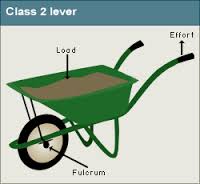 Y’all relax OK Australia finally figured out contemporary American poetry y’all. Post your scores, losers. > 0.5 is professional and < 0.5 is amateur. Be sure to read the, um, “methodology.” According to poetry journalist Patrick Gaughan, the highest so far (at 4.2) is WCW’s good old wheelbarrow coloring book, and noted anti-poetry skeptic/fiction engineer Jonathan Volk reports that “an untitled Jewel poem just got a 1.17.” Stay tuned for breaking developments. (Discovery credit goes to poetry scientist Anne Cecelia Holmes.)
Y’all relax OK Australia finally figured out contemporary American poetry y’all. Post your scores, losers. > 0.5 is professional and < 0.5 is amateur. Be sure to read the, um, “methodology.” According to poetry journalist Patrick Gaughan, the highest so far (at 4.2) is WCW’s good old wheelbarrow coloring book, and noted anti-poetry skeptic/fiction engineer Jonathan Volk reports that “an untitled Jewel poem just got a 1.17.” Stay tuned for breaking developments. (Discovery credit goes to poetry scientist Anne Cecelia Holmes.)
Shanna Compton, Designer
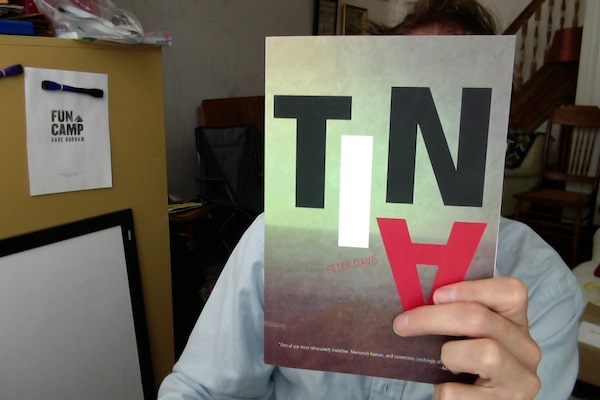
I just got the new Peter Davis book in the mail, Tina, published by Bloof Books.
I haven’t read it yet. This is just to say that Shanna Compton is one of my new favorite designers for poetry books. Her own book, Brink, is also wicked handsome. She has successfully rethought every element of a good book design. Why put what where? The advance praise is at the end. The copyright data gets a line at the bottom of the Table of Contents because that stuff is ugly.
Also, I love Peter Davis’s poetry. Get this for your summer shelf, silly. Review it for HTMLGiant, whydoncha? Watch the trailer, which is better than your average book trailer:
Joe Milazzo’s SUMMER READS
Summer reading picks from Joe Milazzo:
***
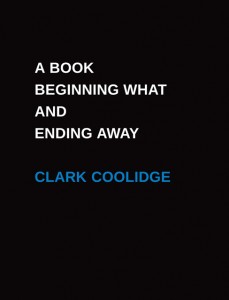 A Book Beginning What and Ending Away by Clark Coolidge (Fence Books, 2013)
A Book Beginning What and Ending Away by Clark Coolidge (Fence Books, 2013)
Partly out of excitement to have this work restored to print; Coolidge is neither understood nor celebrated enough as a prosodist, or, if you prefer, prose thinker, à la Stein (I know this mostly from his writings on jazz / improvised music); the book itself just long and packed / impacted enough to occupy a season.
Randomly selected excerpt: “Door only to be taken in. Mingles into the corner as it comes. Enough, and green, and by and large, were familiar.”
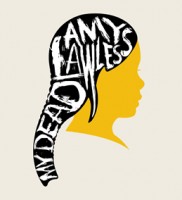 My Dead by Amy Lawless (Octopus, 2013)
My Dead by Amy Lawless (Octopus, 2013)
Have you seen the table of contents? The volume opens with 8 individual poems, all entitled “One Way to Write a Sonnet Is To Number the Lines.” This appeals to me, and aligns with my own formal / lyrical interests.
Randomly selected excerpt: “Night is ugly as all the other shit / I just mentioned”
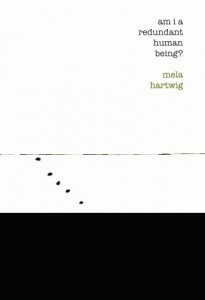 Am I A Redundant Human Being? by Mela Hartwig (Dalkey Archive, 2010)
Am I A Redundant Human Being? by Mela Hartwig (Dalkey Archive, 2010)
I picked this up at the open of the year courtesy Dalkey’s annual sale, but have not yet been able to see if the book itself satisfies the expectations (high-ish… is this Madame Bovary without the self-delusion, an early negation of the novel [an imitation of Arthur Schnitzler tangenting itself into anticipations of Tao Lin], or a Modernist self-help manual?) I have for it based on the title.
Randomly selected excerpt: “Of course, his obvious attraction flattered me. But, then again, maybe it didn’t.”
June 5th, 2013 / 11:00 am
25 Points: Regard (25 parentheticals)
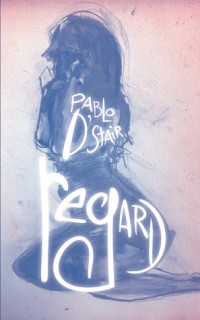 Regard
Regard
by Pablo D’Stair
KUBOA, 2013
280 pages / $7.50 buy from Amazon
1. (all of blue)
2. (having to dig it out of the soil at the base of one of the tree trunks)
3. (of what variety she couldn’t quite make out in the dim lighting)
4. (tipped out of its holder)
5. (transparent yellow with the appearance of bubbles throughout it)
6. (interested that the hole proceeded more straight down than she’d thought it was going to)
7. (she couldn’t seem to settle the question in her mind if this was the usual way of things)
8. (she leaned against not very often)
9. (like the man had in imitation of the dog)
10. (not loudly, but not self-consciously enough to be whispering) READ MORE >
June 4th, 2013 / 3:11 pm
Debra Di Blasi’s SUMMER READS

Debra Di Blasi’s summer reading recommendations:
***
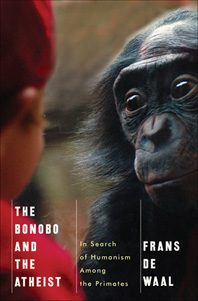 The Bonobo and the Atheist: In Search of Humanism Among the Primates, by Frans De Waal (Norton, 2013)
The Bonobo and the Atheist: In Search of Humanism Among the Primates, by Frans De Waal (Norton, 2013)
The most recent book by hands-on primatologist de Waal once again successfully argues that the study of primatology is not how apes behave like humans, but how humans behave like apes.
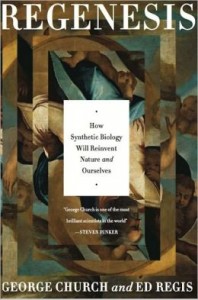 Regenesis: How Synthetic Biology Will Reinvent Nature and Ourselves, by George Church and Ed Regis (Basic Books, 2012)
Regenesis: How Synthetic Biology Will Reinvent Nature and Ourselves, by George Church and Ed Regis (Basic Books, 2012)
Predicts how current and future biological research will lead to transhumanism, genetic regeneration and mutation, and living products that reproduce and redesign themselves. The eugenics potential would make Adolf Hitler proud.
READ MORE >
June 4th, 2013 / 11:00 am
Help Kenneth Goldsmith Print The Internet, or Petition to Prevent Him From Doing It

Conceptual provocateur Kenneth Goldsmith’s new project involves printing off the entire internet. You can follow his Tumblr about it. There you’ll see he’s getting a lot of press for this idea. Some of it positive, some of it negative.
Change.org is actively seeking to stop Goldsmith from going through with his proposition. They’ve started a petition, which you can read here.
If you’re opposed to Goldsmith’s project, you can sign that petition.
If you support Goldsmith’s project, you can join him, and according to his proposal, “Every person who contributes to Printing out the Internet is listed as a participating artist in this group show. LABOR is the best young gallery in Mexico — everyone gets a great line on their resume.”
If you don’t care, you can obviously ignore the whole thing.
My Pet Serial Killer Video
Check out this My Pet Serial Killer (by Michael Seidlinger) Video Review by Angela Xu and Peter Tieryas Liu. Starring Hannah Lee. Read Peter Tieryas Liu review on HTMLGIANT here.
Dysfunction
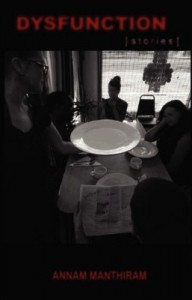 Dysfunction
Dysfunction
by Annam Manthiram
Aqueous Press, December 2012
170 pages / $14 Buy from Amazon or Aqueous Press
The dysfunctional nature of many of the characters that populate Annam Manthiram’s Dysfunction only serve to highlight their strange humanity. Throughout, “Variations on a Blossoming Marriage,” we are treated to an alphabetical catalog of failed relationships. The description for Calla Lily is poignantly emblematic of a plight the characters share: “He liked white— white everything. White sheets, white toothpaste, even white curry. I didn’t know how to make white curry. Everything I touched turned brown.” The clash of tactile expectation versus the moment of actual contact is the intersection that the stories hinge on and that fulcrum becomes more pronounced with the cultural context denoted by brown.
In “Asha Ma,” we are taken through the life of a young Indian woman. From the moment she is born, there is an invisible gauge against which her life is measured. When she fails to match the barometer her mother hoped for during a ritual performed for her first birthday, she is deemed “inauspicious” and “a sacrilege.” The irony is that, of course, a simple baby game intended for playful festivities takes on religious connotations that would haunt her life. In high school, she is often mistaken for another Indian student named Cynthia. When Cynthia takes time off from school due to chicken pox, Asha masquerades as Cynthia, and in a sad commentary on racial stereotypes, the other students can’t tell the difference. No expected fallout happens upon Cynthia’s return, who simply refers Asha to the principal and he in turn to a therapist. Neither of them can help her find what she wasn’t able to track down for her birthday ritual; her identity, mainly because the given categories didn’t fit. A disconnected relationship happens with her co-worker, Joe, whom she both attracts and repels. It ends when she makes out with a stranger at a party Joe invited her to (more specifically, the stranger licks her clavicle). Again, there is no blowout, no jealous outrage by Joe. Instead, he falls for another woman at the office and moves on. The story reaches its denouement with a sordid revelation of a past affair from her parents that causes Asha to come to terms with her absent self. The ending consists of self-discovery in defying self-discovery. Pat epiphanies about ‘place in the world’ are replaced by acceptance of the void of simple being and the climax defuses itself similar to the other encounters in the story.
June 3rd, 2013 / 11:00 am
Memory of the Prose Machine by Sandra Doller
 Memory of the Prose Machine
Memory of the Prose Machine
by Sandra Doller
CutBank Books, Feb 2013
41 pages / $10 Buy from CutBank
Two days before I arrived home to the package that held Prose Machine, I sat in a restaurant in Moab, Utah, arguing with my girlfriend about poststructuralist theory. The endless bit about relevance. Do we really need to know that much about the gap between words and reality? About the absence of a referent for language? We’re eating hamburgers in a café here. We’re on a road trip in Utah. We’re speaking. We’re talking. Hello.
Emily wondered why the academics didn’t quit if the very form of their own work (language) went against the claims they made. As I saw it, admitting that language doesn’t have a one-to-one correspondence with what we’ve always hoped it does doesn’t make communication impossible; it just complicates it. Maybe even frees it.
Sandra Doller is, like me, one of the hopeful. She understands that a splatter of paint on the canvas is going to look like a penis to me and a popsicle to someone else. But that the important thing, I think, is the communication: there’s someone on the other end.
***
The central conflict of Memory of the Prose Machine, as of more than a couple other rad small press prose-poetry type books I’ve read recently, is meaning. That is, what does it mean when she says, in her opening lines:
Sandra Doller knows, because she’s already been told. She “has no theme,” her words are a bunch of words, that’s all, you can’t follow them because there’s nothing to follow. That’s just how the book is. And it’s not uncommon, I think, to have this kind of indeterminate non-referential Rorschach Test type of approach in cutting edge poetic writing these days. Language without a clear function. Phrases not connected in obvious ways. Words as the field of battle, rather than the images they evoke.
June 3rd, 2013 / 11:00 am

